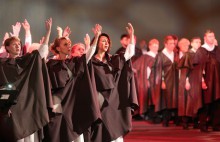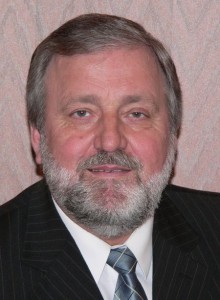The 4th All-Ukrainian Competition of Choral Conductors was held recently in Kyiv. It discovered new names and showed a high professional level of the participants, while the final concert of winners drew a capacity audience at the Lesser Hall of the National Music Academy of Ukraine. The Day interviewed Professor Yevhen SAVCHUK, founder and inspirer of the competition, longtime jury chairman, head of the Choral Conductorship Department of the National Music Academy of Ukraine, artistic director and chief conductor of the Dumka Chorus, and chairman of the All-Ukrainian Music League.
“The competition has been held since 1999 and is aimed at spotting talents. Most of our winners have carved out a career. For example, Bohdan Plish is now the chief choirmaster at the National Opera of Ukraine and Ruben Tolmachov successfully directs the children’s Dzvinochok choir and teaches at the Music Academy. But the problem is that conservatoires’ choirmaster students usually have no practice of working with their ‘instrument,’ i.e. the choir. They are taught to conduct to the accompaniment of a piano in the classroom, whereas real practice, contact with people, is also a talent and skill that requires never-ending work. For this reason, since I began to head the department, Academy students have been working with a choir from the second year onwards.
“We have quite a large student choir, and we can divide it into two categories, the so-called practicums. From the second year on, every student chooses a certain opus and practices it with a choir. And the point here is not so much in producing an artistic result as in learning to work with people and the musical material. And it turns out that those who waved their hands well in class to the piano not always can cope with a choir, a real sound. And the competition of choral conductors is a higher level for those who really see themselves in this profession.
“Although the competition was instituted many years ago, this one is only the sixth. Under the provision, it should be held once in three years, and, besides, no competition took place in 2014 because of problems in eastern Ukraine.
“We customarily say that we are a singing nation. There are gifted people among us, but the prospects of their artistic self-realization are not so rosy now. The competition encourages people to show themselves and prompts them to act.”
“FOLKLORE IS A MANDATORY STAGE IN TRAINING A CHOIRMASTER”
What was particular in the course of this year’s competition?
“We received 33 applications. The first round was usually divided into two phases. The first of them was to do it to the accompaniment of a piano so that we could see the overall picture and do some screening, and the second – to do it with a choir. But, having analyzed the situation, I understood that we must let all the participants work immediately with a live choir. I think this benefited everybody.
“Our Music Academy’s choir catered for the first round – two half-teams by turns. Just imagine how long the choristers must sing if there are 33 participants, each of them taking 20 minutes! It is physically impossible.
“From the very beginning, we wanted to embrace the whole country. This time, too, although there were no participants from Crimea, Donetsk, and Luhansk, various regions were adequately represented.”
Among the items to choose from, there were a lot of Borys Liatoshynsky’s opuses…
“We are trying to be consistent and recommend opuses of different styles and degrees of difficulty in order to see the competitor better. Besides, they must all be in equal conditions.
“For example, the first round this year is the arrangement of folk songs by Borys Liatoshynsky (we selected 7 out of 30). One must know how to handle a folk song. Folklore is a mandatory stage in training a choirmaster. It is the same as the pianist must play Bach – inventions, preludes, fugues, etc. The words and tune of a folk song mirror the national spirit. Although this fact is not much being discussed now, I will remind you that the choirmaster works with people, people are a spiritual basis ingrained in the folk song: it educates the one who sings, the one who listens, and the one who conducts – they come down to earth. If you don’t know your song, you won’t grasp somebody else’s.
“I formed this attitude when I worked with Anatolii Avdiievskyi at the Hryhorii Veriovka Chorus. It is extremely important that every choirmaster acquire this experience. He will then be aware of his people and his own place. This may sound somewhat banal, but it is the truth. What is more, this approach will not keep you from dealing with the best examples of world music – on the contrary, this will allow you to hear other better.”
Did you plan to make the competition international?
“We did have this intention. First of all, it is difficult from the financial angle. The National All-Ukrainian Music League receives funds via the Ministry of Culture. To reach the international level, we should apply directly to the Cabinet, as was the case with the Stepan Turchak Competition of Symphony Conductors. International contests are very expensive, for they involve a large prize fund, payments for the jury, transport, hotels, renting big halls and orchestras, and other inevitable expenses.
“I must say that, on the whole, our choral art has been in dire straits lately. I once attended a competition of choirs – choirs, not conductors – in Italy. Singing was the smaller part of the contest, while the greater part was a debate on how to improve the educative role of music and work with a choir in such a way that it helps bring up a well-mannered and artistically educated person. In this country, we’ve never heard these things discussed! Choirs are very rare now in secondary schools, even the subject ‘Music’ is looked down upon. It’s really a problem.”
“ARTISTS FROM ALL OVER THE WORLD WERE INVITED TO TAKE PART IN THE CONCERT”
It takes time and effort to organize a competition, but you’ve never stopped working on other large-scale projects. Which of them do you think are the most important?
“Out of the really large-scale and important international projects at the beginning of the concert season, in which Dumka took part, I would single out the ceremonial concert at the National Opera of Ukraine, which concluded a week of memorial events to mark the 75th anniversary of the death of innocent victims in Babyn Yar.
“The organizers turned to us on the advice of the well-known composer Yevhen Stankovych. To mark the 50th anniversary of those tragic events 25 years ago, the maestro wrote Babyn Yar, an extensive opus for choir, soloists, and symphony orchestra, based on Dmytro Pavlychko’s verses, which the Dumka Chorus was the first to perform. The original version of the concert was also to include Beethoven’s Symphony No. 9, but it was replaced by Brahms’ German Requiem. This performance was difficult to us first of all because we had to sing both opuses – by Stankovych and by Brahms – from memory and wearing theatrical costumes (the concert was staged by Annechien Koerselman from the Netherlands). Artists from all over the world were invited to take part in the requiem concert, including the Hamburg Symphony Orchestra, the National Dumka Chorus, and soloists from Canada, Britain, Israel, and Germany. Wielding the conductor’s baton was the young talented Oksana Lyniv, who began her career in the Lviv Opera and Ballet Theater, worked with the most renowned European orchestras, and is now a conductor at the Bavarian State Opera, Munich. The soloists were soprano Gal James (Israel), tenor Benjamin Butterfield (Britain), and bass-baritone Pavlo Hunka, a well-known British singer with Ukrainian roots. The latter is not only a good vocalist – he also turned out to be a wonderful actor. This solemn international event was held at a high state level. It was a great deal of creative work for Dumka, and we are satisfied with the result.”
Dumka gave a big concert in Poland recently…
“Yes. It was held at the Warsaw philharmonic. This concert was conceived and organized by Roman Rewakowicz, a Polish conductor of Ukrainian origin, who works actively and fruitfully to develop Ukrainian-Polish music ties. The philharmonic’s main hall was filled to capacity! We have performed in Poland more than once – in this hall, too. In particular, we performed, together with Krzysztof Penderecki, St. Luke Passion in Warsaw four years ago. We also sang his Credo in Krakow and Warsaw.
“The Dumka Chorus presented an interesting program. The first part, conducted by Rewakowicz, consisted of sacral music opuses by Ukrainian and Polish (Gorecki and Penderecki) composers. The second part, which I conducted, heard some popular compositions, including those by Zubytskyi, Stankovych, and Sylvestrov. In other words, it was a major presentation of Ukrainian music.”








